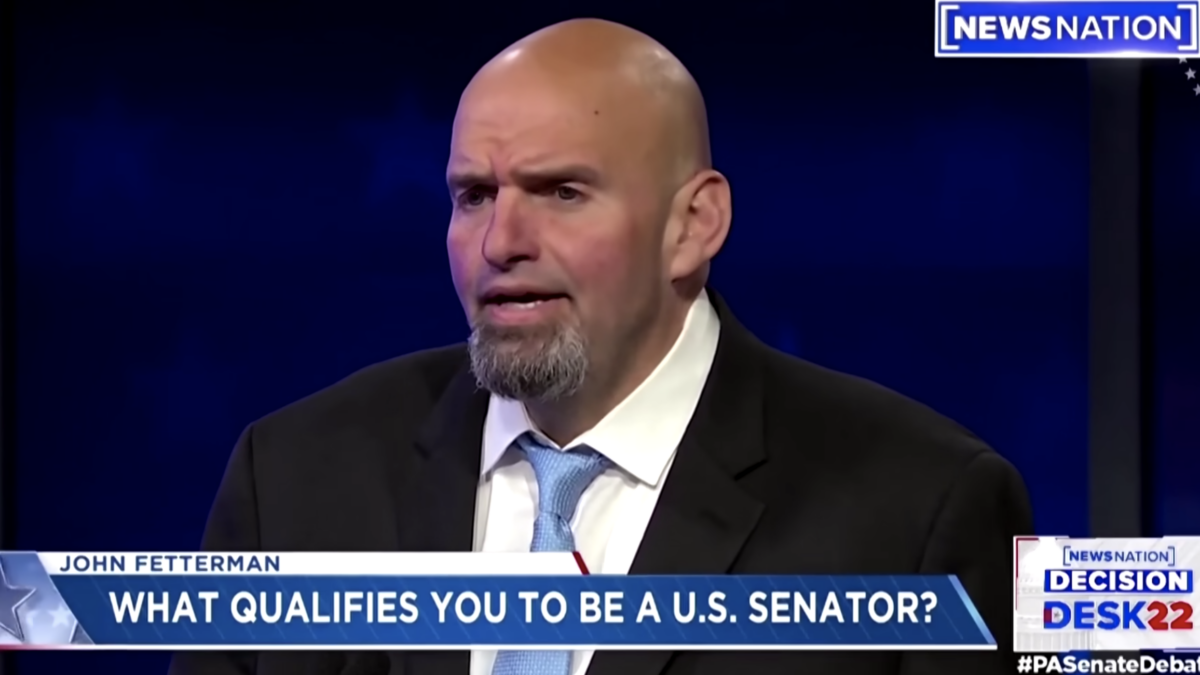Democratic Senate candidate John Fetterman is grossly unqualified to function in the U.S. Senate. Fetterman’s defenders and apologists persist in referring to his communication difficulty as an “auditory” problem, suggesting that he’s just hard of hearing.
Even his critics in general appear to have not zeroed in on what I firmly believe to be his central problem – that is, aphasia – mostly receptive aphasia with some expressive aphasia too. He’s most likely not “just hard of hearing” – if indeed he’s hard of hearing at all.
Fetterman’s campaign has refused to release the candidate’s medical records since suffering from a stroke five months ago, making it impossible to know his diagnosis for sure. But as a stroke victim myself, I’m thoroughly familiar with that combination of aphasic limitations. I continue to suffer from them somewhat after a devastating stroke in 1996 (and after a smaller stroke this year).
Fortunately, I’ve almost fully recovered from my expressive aphasia, and I’ve become much better with my receptive aphasia. My recovery from my first stroke, long afterward, took place by divine intervention, I’m persuaded, after my physicians had said that I would not recover beyond a slight measure.
Even after 26 years, though, I still must rely on closed captions while watching anything on my TV set.
People with receptive aphasia, which produces symptoms like Fetterman’s, hear the sounds, but have much difficulty in decoding and understanding the words – especially while trying to understand fast speech or strong accents. The words just do not fall into place correctly in our brains. That diagnosis would explain why John has used a computer-based closed-caption device during at least one interview and during the debate in Harrisburg on Tuesday.
People with expressive aphasia often have trouble finding the right words and effectively putting them together to express their thoughts smoothly and correctly. Many times I may utter similar words but not-quite-right words.
That diagnosis would explain why during Tuesday’s debate, Fetterman said not “good evening” but rather “good night” in his opening greeting, and why some of his comments and responses sounded so illogical and repetitive.
Aphasia, simply described, is a language disorder caused by damage to one or more of the parts of the brain that control the comprehension of language or the production of speech, or both. Sometimes the damage has resulted from a traumatic injury to the brain; sometimes it has resulted from a shortage of oxygen in the blood flowing into the involved part or parts of the brain; sometimes it has resulted from some other cause, such as dementia or a tumor.
My first stroke, the large one, resulted from a shortage of blood and oxygen in the left side of my brain due to a previously unrecognized nearly complete blockage of my left carotid artery, the vessel which supplies blood to the left side of my brain. The next morning I got an endarterectomy. Of course, we do not know what caused the stroke in the case of Fetterman.
People who suffer from receptive aphasia hear the sounds of the speech of others, but our brains do not process those sounds well enough or quickly enough for us to comprehend the meaning of those sounds. Those unprocessed sounds cause us to feel as though we hear some foreign language that we do not understand and have never known or studied.
When we suffer from expressive aphasia (either with or without receptive aphasia also), we’re tongue-tied – we’re not able to find enough of the right words to express our feelings or ideas, or we’re not able to put the words together smoothly enough or correctly enough.
In the beginning, after my first stroke, I could barely speak a word, and I could barely understand even one word of the speech of others. With excruciating slowness, in baby steps over many years, and with much frustration and embarrassment along the way, eventually, I recovered enough to carry on with my life at an acceptable level of near-normalcy. Although I still must often ask others to repeat.
Naturally, I feel a tremendous degree of empathy for Fetterman about his struggles. However, if it is indeed aphasia that Fetterman suffers from, he cannot perform at the levels required in the U.S. Senate. He’s simply not capable of making wise and informed decisions or taking part in sensible and intelligent discussions because of his language impairments. The Senate is not a recovery facility for post-stroke patients but rather the upper chamber of the legislative branch of our national government, which demands unimpaired performance and uncompromised participation.









